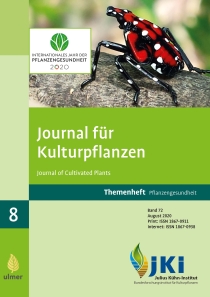Survey on the occurrence of <em>Tilletia controversa</em> in conventionally produced winter wheat in Northern Germany
DOI:
https://doi.org/10.5073/JfK.2020.08.16Keywords:
Tilletia controversa, dwarf bunt, survey, Triticum aestivum, winter wheat, exportAbstract
In Germany the causal agent of dwarf bunt of wheat, Tilletia controversa, has so far been found mainly in organic farming in the southern part of the country, and there especially in the mid mountain ranges and in the Alpine foothills. Whether T. controversa also occurs in conventionally produced winter wheat in the northern federal states was subject of a survey in the years 2016 and 2017. According to the wheat production levels in the German federal states Brandenburg, Mecklenburg-Vorpommern, Lower Saxony, North Rhine-Westphalia, Saxony, Saxony-Anhalt and Schleswig-Holstein a total of 1302 wheat grain samples were analysed originating from geographically representatively distributed operators. 4 of which tested positive for T. controversa (0.3 %). With < 0.5 spores per grain these exhibited a very low contamination level. In 9 additional samples (0.7 %), an infestation could neither be clearly confirmed nor excluded. Repeated occurrence of the pathogen at individual sites in consecutive years was not observed. Thus, T. controversa generally does not play a significant role in the production of conventional winter wheat in Northern Germany. The observed very low spore concentrations could have been caused by rare infection events of seeds that had not been optimally treated with seed dressing. However, it also could have been caused by wind-blown spores originating from neighboring organic wheat fields or by contaminated harvesters or transport vehicles. T. controversa is a quarantine pest in several countries. According to the here reported results, it can principally also occur in the northern federal states of Germany, which is of importance for the export of wheat, depending on the country of destination.
Downloads
Published
Issue
Section
License
The content of the journal is licensed under the Creative Commons Attribution 4.0 License. Any user is free to share and adapt (remix, transform, build upon) the content as long as the original publication is attributed (authors, title, year, journal, issue, pages).
The copyright of the published work remains with the authors. The authors grant the Journal of Cultivated Plants, the Julius Kühn-Institut and the OpenAgrar repository the non-exclusive right to distribute and exploit the work.







